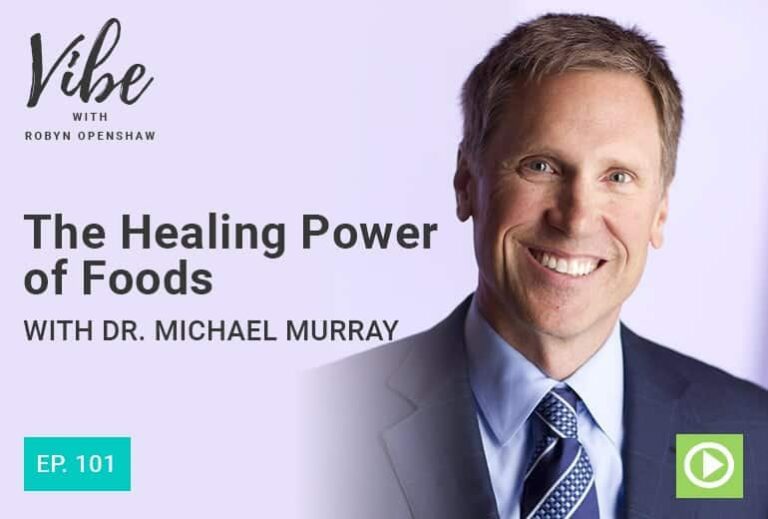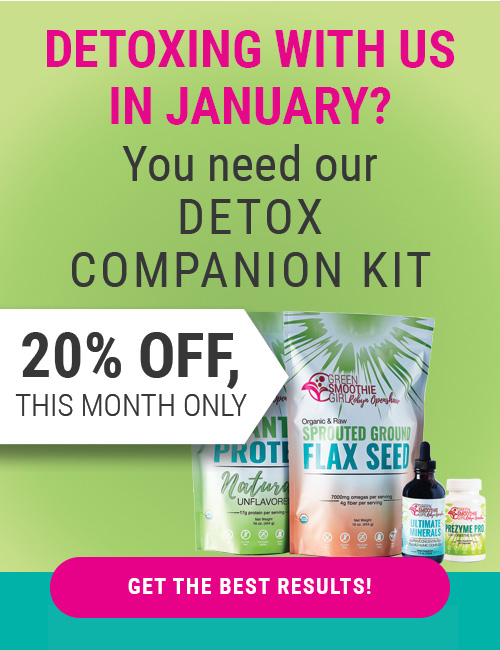Ep. 101: The Healing Power of Foods Interview with Dr. Michael Murray

Podcast: Play in new window
Today we continue our Learn From Our Elders series, where Robyn has curated people who are 65+ and still contributing massively to their own body of work, and to the planet. Dr. Michael Murray is a naturopathic doctor who truly understands the healing power of nature. He says: “Within each of us is a tremendous capacity to heal and be well, the power of nature.” He has experienced personally this healing power in his own life and as an author, teacher and doctor and simply by the way he so passionately and joyfully lives his own life, he has dedicated his life to educating physicians, patients, and the general public on the tremendous healing power of nature. He is especially passionate about all the great foods, and the many wonderful herbs and spices that are found in nature and which give us so much variety and enjoyment in life and help us to live a long and healthy, happy, high vibration life. In addition to his books, which have cumulative sales of over six million copies, Dr. Murray has written thousands of articles, appeared on hundreds of radio and TV programs, and lectured to hundreds of thousands of people worldwide.
LINKS AND RESOURCES:
Connect with Dr. Murray: Click Here
Sign up for The Healing Power of Foods Summit: Click Here
Get the book “The Encyclopedia of Healing Foods” : Click Here
TRANSCRIPT:
Robyn:
Hey everyone. It’s Robyn Openshaw. Welcome back to The Vibe show. Today I’m going to introduce you to Dr. Michael Murray and he is one of the world’s leading authorities on natural medicine. In fact, he’s published over 30 books featuring natural approaches to health. I own a bunch of his books. He serves on the board of regents of Bastyr University in Seattle. And Bastyr is a really great university because it was the first to get accredited in a lot of these arenas of natural medicine.
There’s a quote by Dr. Michael Murray that I like a lot where he says: “One of the great myths about natural medicines is that they are not scientific. The fact of the matter is that for most common illnesses, there is greater support in the medical literature for a natural approach than there is for drugs or surgery”. Obviously this is in keeping with what we explore here on The Vibe show. Dr. Murray is 60 and even though he misses by a few years our seeking out elders who are 65 plus and still doing great work, I still wanted to interview him in that category because he looks amazing for 60. He clearly practices what he preaches.
He’s been really instrumental in bringing some natural supplements to the US that have done a lot of good. Some examples are Milk Thistle extract, Ginkgo Biloba, St John’s Wort, Glucosamine, Saw Palmetto. Okay. There’s a bunch of these that you have probably used and it’s actually Dr. Michael Murray who brought them to American awareness. So he has something coming up that I think is pretty exciting. We wanted to interview him about that and also what he does to stay young and fit and doing his best work when a lot of people are thinking about retirement. So, Welcome to The Vibe show, Dr. Michael Murray.
Dr. Murray:
Well thank you Robyn. It’s always a great pleasure to talk with you and, what an exciting topic. Thank you for conducting these interviews.
Robyn:
Well, we’re excited to learn from you as one of our elders. You didn’t actually qualify as 65 plus, but you’re getting close to the category and we wanted you to be on the show because you’re still doing great things and a lot of people at the age of 60 plus, their big goal is to spend a lot of time playing golf and you’re still out there doing great stuff.
Dr. Murray:
Well, I tell you what, I am highly motivated to keep getting better. And uh, that includes, obviously my health and I feel fantastic at 60. I chuckle when people say that they feel as good as they did when they were 20 or 30 or even 40. I think they’re just forgetful. What I’ve noticed is that yeah, I’m still passionate about life and I still have great energy levels. I enjoy a great life. But, uh, yeah, aging does take its toll, especially when we travel and when we exert ourselves. But uh, you know what, we can always strive to maintain our health and get better each and every day.
Robyn:
Well, you know, I have four bookshelves throughout my house, all of them packed with hundreds and hundreds and hundreds of wellness books, and you have the dubious distinction of being the author of the biggest fattest health book that I have. In fact, fun fact, it’s actually underneath my microphone right now because it’s the fattest book I own and it needs to reach up to the level of my mouth. And your book is called, “The Encyclopedia of Healing Foods” and it’s one of, How many books have you published?
Dr. Murray:
Uh, I’ve written over 30 books and, I love that book. I appreciate you having it. My bestselling book is “The Encyclopedia of Natural Medicine” and I love that book too. You know, our books are like children, we don’t want to say one’s more favored than another. But, I love food and writing “The Encyclopedia of Healing Foods” was just great fun and uh, it’s very inspirational. For me, the more I learn about food, the more I learn about nature and natural healing, the greater my respect, appreciation and awe that I have for nature.
And I don’t know if you’ve ever had this experience Robyn, but you know, when I’ve a new audience, like at a dinner meeting or whatever and we’re served healthy food and I just can’t help myself. I just start talking about, hey, did you know this food is good for your liver? This food has been shown to help improve brain function or whatever. I’m telling people about what health benefits they’re going to get from eating this healthy meal in front of us. And it’s amazing how many times people look at me an they’re almost dumbfounded. And they say, wow, I never really thought about it, but it’s almost like these plants were placed here to help us be healthy. Like, yeah, that’s, that’s exactly right.
Robyn:
Well, I would expect nothing less and nothing different than that you be the sort of Cliff Clavin of the natural foods world since you did write an encyclopedia of food. So…
Dr. Murray:
It’s great fun. And, what I like to get across to people is that the greatest technology in the universe is nothing that man has created. The greatest technology is nature. And the way we commune with nature on a daily basis is through the food that we eat. And we’re just scratching the surface and understanding how food can affect our health, promote health, or on the flip side, the wrong food choices can be really catastrophic to our health. So, I really believe that the future of medicine is food.
And, uh, I just got done finishing a summit that’ll be a launching on October 13th. “The Healing Power of Food Summit” was a great event. Uh, we recorded over 30 interviews with some of the top experts in the world on food and medicine and they all had different opinions, but there was more common ground than disagreement. But the underlying theme is that, the future of medicine is food and we’re learning more and more how we can utilize food in ways to really help people achieve their health goals.
Robyn:
Okay. So I’m dying to hear more about the summit because you have a lot of my personal heroes on there. You have quite a few folks that we’ve had, speak on the summit. I Know David Katz, Joel Furhman, Michael Gregor and others. But before we go there, I want to back up because I want to talk about you a little bit. I want to talk about why you chose to be a naturopathic doctor and what you think is happening. Why did you decide to be a naturopathic doctor instead of a medical doctor? What’s in your background that made you go this unconventional route?
Dr. Murray:
Well, I went and saw naturopathic physician when I was 19 years old. And, uh, it was a life changing experience for me. Uh, my dad had turned me on to this doctor. My dad had developed Bell’s Palsy and that’s a condition where you lose the innervation to the muscles in your face and the left side of his face was just basically non functioning. And he went and saw this naturopath Dr. Ralph Weiss, who literally brought his face back to life.
And I had had a knee operation and my leg hadn’t responded fully to physical therapy and all the other steps that I was taking. And so my dad really encouraged me to go see this doctor. And I did, and it was amazing, and just a life changing experience. And the more I started looking into nutrition and herbal medicine and all these other natural approaches, it just made a lot of sense to me. And, so I changed my focus from pre-law to pre-medicine and, was all gung ho to become a naturopathic physician.
Robyn:
What do you think some of the most exciting things are that we’re on the cusp of in functional medicine or naturopathic medicine?
Dr. Murray:
Well, I just think that, the constant and ever growing appreciation of the role that food plays in our lives and I just think that we’re on the cusp of really understanding to a much greater degree how food impacts our health. And I think this discovery of the microbiome, well you know, it’s always been there, but now we have technology that allows us to really gauge the impact of foods and diets and other approaches that can really influence the type and function and activity of different gut microbes. And that plays a huge role in our overall health as well as we might be able to use food to indirectly impact various health conditions through the microbiome.
For example, one of the most provocative studies occurred about 15 years ago. It was published in the medical journal Nature. And this study, it got everyone so excited because it may be this simple at some point. What they did in this study is they took the fecal contents of fat rats and inoculated skinny rats, and they had taken the fecal contents of the skinny rats and inoculated the fat rats. And the fat rats became skinny, the skinny rats became fat. And the reason is, because they switched out their gut microbiome.
And so that really initiated a lot of research on how we can influence the microbiome to maybe help people lose weight, reduce their risk of heart disease, Alzheimer’s disease, and all these other chronic degenerative diseases. So, I think that’s really exciting and we’re really just on the cusp of understanding exactly how to go about doing that. We do know that many of the healthy diets out there are really great for the microbiome and accomplish eventually what we’re trying to do and that is create a healthier microbiome.
Robyn:
Yeah. I’m not surprised that you brought up all the emerging science about the microbiome because I think it’s one of the things we’re hearing the most about. I start to see people, I feel like, jumping the gun and saying, okay, based on your microbiome, you should have this specific diet or that one or that one or that one, which feels kind of like that old eat right for your blood type, which is a little bit theoretical. Maybe jumping the gun a little bit, but I’m excited to see what comes out of the human microbiome project because it’s all this emerging science because I do think it’s going to change many things. I think we know a ton about nutrition and people don’t realize how much we actually really know. It’s all pretty fairly settled. But I also wonder what you think is gonna happen in the field of genomics and epigenetics in naturopathic medicine?
Dr. Murray:
Oh absolutely. And that’s another big piece of the puzzle. The future of medicine is going to involve really taking a look at someone from a more holistic perspective. The thing I like about the microbiome research is that if we look at what influences the microbiome, it’s just about everything. The microbiome is influenced by not only our diet but also our thoughts, our emotions, our experiences, it’s affected by environment, it’s affected by physical activity, and hormones. So everything kind of impacts that microbiome. And we have more genetic expression happening through the microbiome than we do in our own body.
In terms of genomics and nutrogenomics, that field too, is really exciting and I think in both genomic research as well as microbiome research, what’s going to happen, Robyn, is that anytime there’s an advance in science, we have to discard old thoughts because they’re no longer true. And there’s a lot of things out there on the Internet and in the market, I think, promoting certain approaches to dealing with the genomics and also the microbiome that I think will not stand up to the test of science and time. Uh, and in particular I think it’s, um, it’s going to be a lot different what we utilize in terms of probiotics and prebiotics to influence the microbiome than the tools that we currently have. And I think some of the tools that we have right now will be disproven.
Robyn:
Interesting. And so your project that you have coming up that I think is really interesting because you brought people together from a lot of different camps is “The Healing Power of Foods Summit”. And I’m excited to hear what you have to say about what it was like to bring together the vegans like Dr. Fuhrman, and Ocean Robbins, both friends of mine. And David Katz from Yale University who definitely comes down, examining the evidence on the side of the plant based diet, but is a little bit more moderate. You have Paleo people and Keto people like Mark Hyman and others. What was it like to bring people from all sides of the fence?
Dr. Murray:
Well, I think there’s more common ground than disagreement. Everyone is singing the same song about the need to get away from processed foods and refined carbohydrates, unhealthy fats. Everybody’s on board with that. I think that one thing that’s really clear is that it’s hard to say that there’s one diet that fits all. And I’m a big fan of people that empower consumers, empower their patients and are pragmatic, not dogmatic, in determining what’s the best diet for that particular person. Uh, you know, being a health advocate myself, you know, I’ve tried all these different diets and I found what works for me.
Just to give you an example, intermittent fasting is something that is really popular right now, we’re just inundated with all these testimonials from people before and after pictures and people talking about, you know, ketogenic diet and intermittent fasting and burning fat and all that. And I said, well, I want to give this a try before. You know, intellectually, I don’t know if I could argue that that’s the ideal human diet, unlike others that have kind of fallen for that thought. I can’t make that argument because I think that when we get away from good high quality sources of phytochemicals, which also include carbohydrate sources, uh, we’re going to be in conflict with that ketogenic diet.
So anyway, so when I went on the intermittent fasting and ketogenic approach, uh, with the intermittent fasting in particular, uh, what happened was that I was actually losing muscle mass. I have one of those scales that allows me to monitor my body fat percentage, my muscle mass, my water content and my overall body weight. And what I’ve found is if I’m not grazing, if I’m not eating more frequently, it sets the stage for me to start burning muscle mass. And that’s not a good thing to happen.
So for me, intermittent fasting is a no go. Do I need to go Keto to have good insulin sensitivity and build muscle, and keep my blood sugar levels under control? I don’t think so. I do think that, uh, there are some people that can benefit especially short term on a very low carbohydrate diet, but I think long term, uh, we’re designed to eat a diet rich in these plant foods. So, uh, I’m a big proponent of eating a low carbohydrate load diet, but really focusing on those good quality fruits and vegetables that won’t impact our blood sugar levels adversely.
Robyn:
Yeah. It’s so funny that you just answered a question that I didn’t ask because I’ve asked a 19 experts on this show in the last year and we’re about to publish a blog post called “19 health experts debunk the Ketogenic diet” and I think I might hold the presses for a minute and get the transcript of what you just said there and make it 20. I mean it’s always more fun when it’s an odd number and that makes it way too even. So I might have to go round up one more. But you actually asked a question that I’d sort of retired because I think maybe my followers here on the podcast are getting a little tired of me asking people what they think of the ketogenic diet. But you actually just answered the question without me asking it.
And that’s an interesting take that you measured what happened when you do intermittent fasting because you’re right, it’s very much a trending subject. We’ve interviewed Dr. Valter Longo on the show and you’re probably aware he published the longevity diet at the beginning of this year and he reviews the evidence, for fasting. I’ve been experimenting with fasting. I’ve done four fasts in the last two years of one to two weeks myself. And I was raised in a religious tradition where from the time I was eight years old, I fasted for 24 hours once a month. And it was not particularly for physical health reasons, but it was more a spiritual practice. But I’m super interested to hear that you had a different experience with it. And there’s always room for individuality here. Very interesting.
Dr. Murray:
Yeah. And I’m not alone with that experience. But, you know, like I said, there’s a lot of people that achieve significant health benefits from intermittent fasting. I think one of the things I like about it is that, uh, for people that have difficulty with portion control and discipline, it really gives them a framework that will allow them to be successful. So, uh, everybody should have that feeling of being hungry on a regular basis. It’s not a bad thing to experience and it helps us be grateful for all the abundance that we have. But I think the experience of being hungry, is something that I think our body really does respond to. In this day and age, you know, very few people really ever experience that. So I think that’s one of the benefits of an intermittent fast.
Robyn:
Yeah. I actually think that the word is kind of funny, intermittent fasting because when you actually see the definition of it, it’s like, that’s not really fasting.
Dr. Murray:
Yeah, yeah. It’s funny, isn’t it? Because when you look at the different blocks of time, a lot of people are unknowingly doing intermittent fasting, that’s just the way their lifestyle works. Uh, you know, there’s so many things that we can experiment with. For me, for example, I find that my body responds really well when I exercise in the morning if I exercise more on an empty stomach, than if I had even a protein shake or breakfast. So, um, you know, other people, they may find just the opposite.
I like monitoring, so I have this special scale, like when I work out, I have a heart rate monitor. I think these are like dashboards when you’re eating or working out or trying to be healthy, if you have no dashboard, it’d be like driving a car without a, without a dashboard. You wouldn’t know how fast you were going. If you had to get gas or anything that is wrong with the car, you wouldn’t know.
So I like these tools that are now available and they’re getting more sophisticated. I mean, you know, the Apple Watch comes with, you can do an EKG on the Apple Watch. So you know, it’s the future, we’re going to have data that’s going to tell us, our blood sugar levels, our cortisol levels, all of these different bio-markers, the degree of inflammation, the activity of our microbiome, we’re going to cues to drink water if we’re dehydrated. I mean, uh, it’s gonna be a proper use of this technology that we’ve developed, we’re going to be able to use it to help people live healthier lives.
Robyn:
Interesting. I’m just waiting for the Apple Watch to be able to guarantee me that it doesn’t have such high EMF that it’s going to make my wrist bones disintegrate.
Dr. Murray:
Yeah. We’ve all fallen in love with technology, that’s for sure. I shouldn’t say all of us, but a lot of us have and often it’s at a detriment. I mean, we’ve all seen this at restaurants, right? We look around at a restaurant and nobody’s talking to each other. Everybody’s on their phone.
Robyn:
I especially notice all the single parents with two and three kids who are staring at their phones while their parents buy them an expensive dinner.
Yeah, so you said something I wanted to go back to because we’re curious what people who are older than we are, who are more advanced in their knowledge and wisdom, who have accomplished more than we have. You’ve written twice as many books as I have. I’m at 15. You’re over 30. We want to know what you’re doing that works for you? Dr. Murray, you look a lot younger than you are. I’m seeing you on video. This isn’t a video podcast, but people should know that you’re extremely fit and youthful looking. And so we want to know what you do. You said, I have figured out what works for me.
I did a review of Bob Harper’s new book recently, which I thought was really interesting in the sense that he was recanting. He’s the Biggest Loser personal trainer and he basically said a year or so after his widow maker heart attack and he had gone to, you know, Esselstyn’s plant based diet. And he wasn’t Vegan by the time he wrote the book, but he was much, much more plant based. He said, hey, sorry for all the people that I told you to obsess about protein, I didn’t know any better. I was overeating protein. I was massively over eating protein. I want to repent. I want to teach you about high nutrition carbohydrates, (talking about fruits and vegetables, like you and I were discussing before we started recording). But I would love to know what do you eat and what else do you do besides what you eat that make you youthful and vital at 60?
Dr. Murray:
I think to be truly healthy, we have to approach it from every possible angle. Uh, I like that parable or the poem about the blind men and the elephant. You listen to various health experts, they’ll talk about, oh, this is the key to health and this is what you have to do. Whenever I give an interview on TV or radio, it always seems that I get asked, well, what’s the most important thing? What do you recommend? If someone had to do one thing, what would it be?
I say, that’s easy. I’d recommend they do everything. Because that’s really what you have to do. You have to develop a positive mental attitude. You have to have a health promoting lifestyle, you have to eat in a health promoting way. And I think you have to support your body through the use of nutritional supplements and other natural products, as well as body work.
And that’s what I’ve done. I’ve been a health nut, I guess since I was 19. I think in many ways I’m healthier today than I than I’ve ever been. I think part of that is getting older and relaxing certain attitudes and letting things go that you can’t control and then recognizing what you can control. And try to maximize your effort there. But yeah, I take a very holistic approach to health. And as far as my diet goes, it’s the same thing, I look at, you know, what does my body need and what should I have?
And one of the things that we’re learning about with the microbiome especially, is the importance of diversity in the diet. And so, what I’ve done recently in the last, oh, probably, 18 months, is I’ve really been more mindful about creating more diversity in my diet. So many people are eating the same foods, even if they’re healthy foods, if you’re limiting your diet to just, uh, you know, 10, 12 different foods that you’re rotating through, I don’t think that that’s really healthy. So, uh, I’ve really tried to create more variety in my life and one of the great ways to do that, Robyn, is through using herbs and spices. And that’s one of my axioms for health, is to spice it up, to herb it up, you know, throw in more spices and herbs in your dishes.
And, uh, you know, the American diet is generally pretty bland and these herbs and spices, these are concentrated sources of these phytochemicals, these plant based chemicals that are so important to our health. And gee, you know, take advantage of these things. It adds more variety not only in terms of health benefits but also in our enjoyment of food. Uh, so anyway, that’s something that I’ve really been mindful about and trying new things. And so, uh, you know, eating a greater variety of foods. I am high protein, high quality fat, low carbohydrate diet. It’s not anywhere near low carbohydrate as Keto, but it is a lower in carbohydrate than probably a typical vegetarian diet.
Robyn:
Well, it’s like you said, there are probably a lot of these healthy diets that get rid of the processed foods that lead to a healthy microbiome. And, I believe that. And even though you know, if my audience wants to know one thing about me, it’s, what do I eat? Even though I say I really don’t eat animal products, I also don’t believe that you have to be a Vegan to be healthy and I think there’s plenty of people doing some version of the Paleo Diet. We’re all friends, we’re all friends here. We’re all on the same team. We’re all really focused on the commonalities that we have, which are, the processed foods are going to kill us. So, the less, the better. I don’t think there’s anybody who’s going to say don’t eat vegetables.
So tell me, uh, just a few tidbits about the summit. If you would like to sign up for the summit, it will be free for a short time starting October 13th, my friends. And so you can get it at greensmoothiegirl.com/healingfoodssummit. Greensmoothiegirl.com/healingfoodssummit. Tell us some of the most interesting people that you interviewed and what they talked about. I mean, I’m sure they didn’t all just say eat more fruits and vegetables. There’s probably more.
Dr. Murray:
It was great fun. One of the interesting things about our field, Robyn, is the people are so passionate and they’re really good people. And that’s really the thing that struck me. And they’re sincere, these are genuine people. So everyone had their story and their perspective and their opinion. But the bottom line is they’re good people. And uh, lots of interesting things. Naveen Jain, telling people about Naveen. Naveen is the CEO and founder of Viome, which is the microbiome assessment company. Naveen had great success in the business world and he’s a philanthropist and he’s got multiple entrepreneurial activities, but he wants to make disease optional and he believes that, you know, working to understand the microbiome is the way to do that. And so we’ve been talking about the importance of that, so I’ll say that Naveen’s interview, his was one of the tops.
I liked kind of the Paleo and Keto, lectures that we had too. We had, you know, Robb Wolf and David Jockers and uh, I thought they were very eloquent and made really strong cases. Of course we all love Ocean Robbins of The Food Revolution Network and he’s just very passionate, has a great story. And uh, he takes a global look and talks about not just the health benefits of the, you know, primarily Vegan Diet, but also the social and environmental impact. So that was very provocative.
And then we had Joe Pizzorno, my friend, coauthor and mentor talking about the importance of eating uncontaminated food. And you know, Robyn, I think the greatest threat to human health today is not too much sugar or some super virus. It’s really this ever increasing environmental load of toxins, pesticides, herbicides, flame retardant. So these persistent organic pollutants, they’re really disrupting our health. And Joe does a great job of laying that argument and that’s a really powerful interview.
Ben Lynch talked about, nutrogenomics and dirty genes and how to influence your genes through the foods that you eat. Trevor Cates talked about clean skin from within. We had lots of people talking about reducing inflammation through changing your diet. Tom O’bryan, Peter Osborne, Steven Masley, all great insights.
And, uh, yeah, and then Susan Peirce Thompson. I liked her personal story. She has a program called Bright Line Eating. And what that means is that she believes that you have to have a bright line of things that you’re absolutely not going to do if you want to achieve your weight loss goals. And she’s someone who’s been able to achieve and maintain weight loss. And, uh, I think that practical advice along with all this great science and experience that she has, it’s just fantastic to hear her story.
And then for a lot of the people in the US, they’ve never heard of Patrick Holford. And Patrick is a UK nutritionist and researcher. And so it was really great to give him a platform to introduce all the wonderful work that he’s done in his career to the American audience.
Robyn:
Well, it sounds like a great lineup.
Dr. Murray:
Those are just some of the highlights.
Robyn:
Yeah, You have a lot more speakers than that, but I know and love many of the speakers that you had on the summit. So I’m excited about it. It starts October 13th. Again, you can sign up for it for free. Definitely want to listen during that first week when the whole thing is free. It’s at greensmoothiegirl.com/healingfoodssummit there’s two s’s in a row there in foods and summit.
And so Michael, I’m excited about this work that you’re bringing forth and thanks for bringing everybody around the table because we really are all on the same team here. And thank you so much too for being on the show today.
Dr. Murray:
Well, you know, I’m a big fan. Keep up the good work. I appreciate the opportunity to share with your audience.













